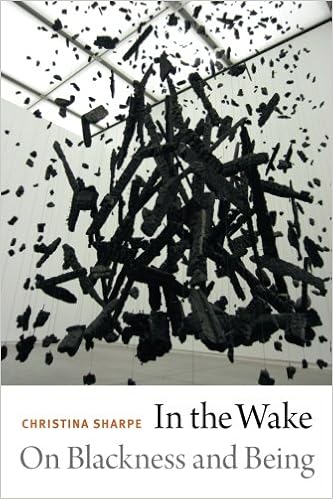
In the Wake stands at the thematic and methodological crossroads of Black literary, visual and queer studies and philosophy. Its evocations are so haunting and yet so seared into present/time, that they parallel Coltrane, part a complex and lush lyric/line that one can follow if focused, partly a brilliant engagement that’s operating just at the outer edges of one’s intellectual reach because of the ways in which it plays/with inherited forms that aren’t capacious enough to contain their subjects and expression. Like Coltrane, Sharpe plays and fractures form in the wake of Black life, insisted upon, as she puts it, in the face of imminent and immanent Black death and “in the residence time” inhabited by our ghosts and our Gods.
In the Wake makes path-breaking methodological interventions, arguing not for inter- or multi-disciplinarity, but asserting, rather, that “we must become undisciplined.” Sharpe addresses the making and unmaking of (narrative, memory-laden, cross-temporal) afterlives of enslavement marked by continuous and connected traumas and argues for a “new mode and method,” one she models to luminous effect. Sharpe’s curatorial practice is both so broad in Diasporic time and place and so precise in the rich and resonant tones of the archival notes she plays, that it both engages multiple (visual, performance, print, family) archives and moves past them to sit with the quotidian ruptures that were lodged but (so often) not logged. Sharpe’s thinking about “The Ship: the Trans* Atlantic” is a Diasporic and cross-disciplinary tour de force in a book that itself is a hallmark achievement. Sharpe manages to give voice to that which is beyond language, beyond border and nation, beyond human worth, beyond a grammar that can contain this expression. The work stuns in how it holds so many ideas and objects of analysis together with such eloquence and force.
Christina Sharpe accomplishes a rare thing: it is beautifully, lushly written academic prose that’s impeccably curated, deeply historical, and also both philosophically precise and evocative. This is a rare feat in a field that returns to her subject again and again because language and form are not expansive enough to hold (to invoke her term) the questions such an existential dilemma as Black diasporic wakefulness. Such a signal achievement will be read and taught widely.
No comments:
Post a Comment